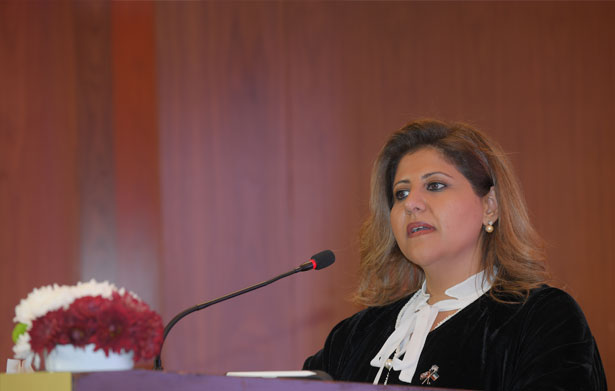Speeches of the Participants
Ambassador Sheikha / Jawaher Ibrahim Da'ij Al-Sabah
Assistant Minister of Foreign Affairs for Human Rights Affairs
Honorable attendees,
Peace be upon you and the mercy of Allah and His blessings,
I am pleased at the outset of my intervention to extend greetings and appreciation to Her Excellency Sheikha Fadia Saad Al-Abdullah Al-Sabah - President of the Kuwaiti Union of Women's Associations, for organizing this conference under difficult and critical circumstances facing the region, particularly the tragic humanitarian situation in Gaza, unprecedented in history, and at the same time, I would like to welcome our guests who have come from various Arab countries, wishing them a pleasant stay in the State of Kuwait.
Ladies and gentlemen,
It is regrettable to witness the increasing number of martyrs and casualties among innocent civilians after 131 days since the escalation in Gaza, with women and children constituting the majority, amidst a glaring failure of the international community to put an end to the cycle of continuous and escalating violence in Gaza.
Esteemed ladies and gentlemen
Through my intervention, I would like to shed light on the relationship between international humanitarian law and Security Council Resolution 1325, focusing on non-combatant women in conflict.
Firstly, regarding international humanitarian law: International humanitarian law grants women in times of conflict general protection as civilians and specific protection, considering that women may be particularly vulnerable to specific forms of violence, especially sexual violence.
Women in times of conflict are entitled to guarantees provided to all protected persons, as well as the right to humane treatment at all times and protection from all forms of violence or other acts. In addition to these rights, humanitarian law acknowledges that "women must be specially protected against any attack on their honor, in particular against rape, enforced prostitution, and any form of indecent assault" (Geneva Convention IV, Article 27; Protocol I, Article 76-1).
Special protection for women includes:
- Provisions of international humanitarian law, which provide additional specific protection for women, either as general provisions, as in the case of Article 14 of the Third Geneva Convention requiring that women be treated "with all consideration due to their sex," or more specific provisions, such as those in the Third Geneva Convention which clearly specify how this obligation should be implemented in practice. For example, provisions regarding the allocation of accommodations and separate health facilities for female prisoners of war, as well as direct supervision by women (32).
- Rape, enforced prostitution, and any other form of indecent assault are prohibited under international humanitarian law during international and non-international conflicts (Geneva Convention IV, Article 27; Protocol I, Article 76-1; Protocol II, Article 4-2). However, rape has only recently been recognized as a serious violation of humanitarian law.
I will address some elements as follows: Firstly, women in pregnancy and motherhood:
- Pregnant women are classified under "wounded persons," and thus they benefit from the same "special protection and respect" afforded to the wounded and sick under humanitarian law (Geneva Convention IV, Article 16; Protocol I, Article 8).
- Parties to the conflict must seek to transfer pregnant women to hospitals or safe areas outside besieged and encircled areas (Geneva Convention IV, Articles 14, 16, 17, 21, and 22). Whether evacuated or not, necessary assistance must be provided to them, and states must allow the passage of any supplies of essential foodstuffs, clothing, and tonics intended for children under fifteen, pregnant or nursing women (Geneva Convention IV, Article 23).
- In the presence of pregnant women and mothers of children under seven, as well as children under fifteen in areas under the control of one of the parties to the conflict, and if they do not belong to the nationality of that party, they must benefit from the special services provided to nationals of the concerned state (Geneva Convention IV, Article 38-5).
- The occupying power must not cease to implement any preferential measures for the benefit of women and children adopted before the occupation (Geneva Convention IV, Article 50).
Secondly, civilian detainees:
- Women must be treated with all the consideration due to their sex, and in any case, they must receive treatment no less favorable than that accorded to men (Geneva Convention III, Articles 14, 16, 49, 88; and Geneva Conventions I-III, Article 12).
- Women must be detained or arrested separately from men (except civilian detainees who reside with their families), and this must be supervised directly by women (Geneva Convention II, Articles 25, 79, and 108; Geneva Convention IV, Articles 85, 76, and 124). Pregnant and nursing women and children under fifteen must be provided with additional food suitable for their physiological needs (Geneva Convention IV, Article 89). They must also receive treatment and care accordingly.



